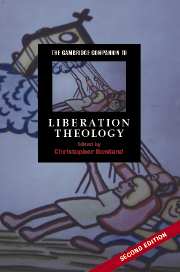Book contents
- Frontmatter
- Introduction: the theology of liberation
- Part I Contemporary Liberation Theology
- Part II Aspects of Liberation Theology
- Part III Analysis and Criticism
- 10 Liberation theology and the Roman Catholic Church
- 11 Marxism, liberation theology and the way of negation
- 12 The economics of liberation theology
- 13 Political theology, tradition and modernity
- 14 Globalising liberation theology: the American context, and coda
- Epilogue: the future of liberation theology
- Select bibliography
- Index
- Series list
14 - Globalising liberation theology: the American context, and coda
from Part III - Analysis and Criticism
Published online by Cambridge University Press: 28 January 2008
- Frontmatter
- Introduction: the theology of liberation
- Part I Contemporary Liberation Theology
- Part II Aspects of Liberation Theology
- Part III Analysis and Criticism
- 10 Liberation theology and the Roman Catholic Church
- 11 Marxism, liberation theology and the way of negation
- 12 The economics of liberation theology
- 13 Political theology, tradition and modernity
- 14 Globalising liberation theology: the American context, and coda
- Epilogue: the future of liberation theology
- Select bibliography
- Index
- Series list
Summary
In August of 1975 the 'Theology in the Americas' conference was held in Detroit.It was an exceptional gathering that brought together major figures of theAmerican theological landscape including, among others, Gustavo Gutiérrezand James Cone, Hugo Assmann and Rosemary Radford Ruether, Juan Luis Segundo andDeotis Roberts, Enrique Dussel and Gregory Baum. To read the proceedings is to betransported to a different time, a time giddy in the hope that the theologicaltransformation brought about by liberation theology would also change society.Passion, urgency, at times anger, emerged from discussions framed around thequestion - 'What would constitute a “theology in the Americas”?'While this question and the many answers posed obviously mattered deeply toliberation theology’s founding figures, whether Latin American, Black,Feminist, Chicano, Native American or White, it is no longer asked. The purpose ofthis chapter is to ask it again.
Asking this question today, however, requires running against the grain ofdominant trends in both scholarship on liberation theology and present-dayliberation theologies themselves: the former examines liberation theologiesindividually while the latter has become a rich and growing forest of theologicalperspectives that stakes out particular claims for particular communities. Thetendency towards particularity emerges, of course, from liberationtheology’s stress on the contextual nature of the theological enterprise.While unbelievably broad by today’s parameters, the Detroit conferenceitself struggled with how to contextualise the Americas, oscillating between, onthe one hand, understanding them as the United States and Canada only, and, on theother hand, understanding them as Latin America, the United States and Canadatogether.
- Type
- Chapter
- Information
- The Cambridge Companion to Liberation Theology , pp. 278 - 303Publisher: Cambridge University PressPrint publication year: 2007

